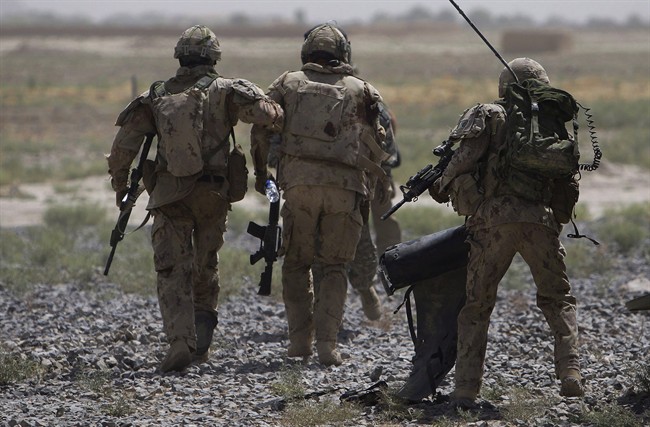A new study from the University of Manitoba has found that although members of the Canadian Armed Forces (CAF) are more likely to attempt suicide than the rest of the population, they are also more likely to seek mental health services.

The study, published in the Canadian Medical Association journal Tuesday, found that between 2012 and 2013 Canadian military members were 32 per cent more likely to have suicidal thoughts and 64 per cent more likely to plan their suicide than the average person.
However, researchers found that members with suicidal thoughts were not only more likely to get help, they accessed more types of professionals for help than civilians suffering the same mental health issues.
READ MORE: Nearly half of Canadian military personnel exposed to child abuse before joining, researchers say
“This study supports the criticism that the Canadian public health-care system is not universal but has significant inequities, inefficiencies and varying levels of service,” said Dr. Jitender Sareen, co-author of the study.
“It also speaks to potential value of incremental investments in the public system, similar to those made in the CAF.”
The study also reported that suicidal thoughts decreased in women, but not men, over time. Researchers suggest this is because women were more likely to seek help from a mental health professional.
According to the study, the CAF has made greater investments in mental health services over the past decade when compared to the public sector.
Yet, for years, the military has faced backlash over its response to mental health issues among its members.
The results of the 2013 Canadian Armed Forces Mental Health Survey found that one in six members reported experiencing symptoms associated with at least one of the following mental or alcohol disorders in the previous 12 months:
- Major depressive episode
- Post-traumatic stress disorder (PTSD)
- Generalized anxiety disorder
- Panic disorder
- Alcohol misuse
- Alcohol dependence
INVISIBLE WOUNDS: Crisis in Canada’s military
According to a Canadian forces study published in November 2015, members of the army were 3.4 times more likely to kill themselves than non-army members of the CAF and at least 50 per cent more likely to kill themselves than the average Canadian of the same gender and age.
Neither the 2015 study, nor the recent University of Manitoba study, looked at Canadian veterans, despite calls for better mental health services amid what they say is a crisis of under-treated PTSD, depression and anxiety.
- RCMP arrests alleged hitmen accused of killing B.C. Sikh leader
- Fall COVID-19 vaccine guidelines are out. Here’s what NACI recommends
- Some 2019 candidates ‘appeared willing’ to engage with foreign interference: Hogue inquiry
- Thousands of Canada’s rail workers have a strike mandate. What happens now?




Comments